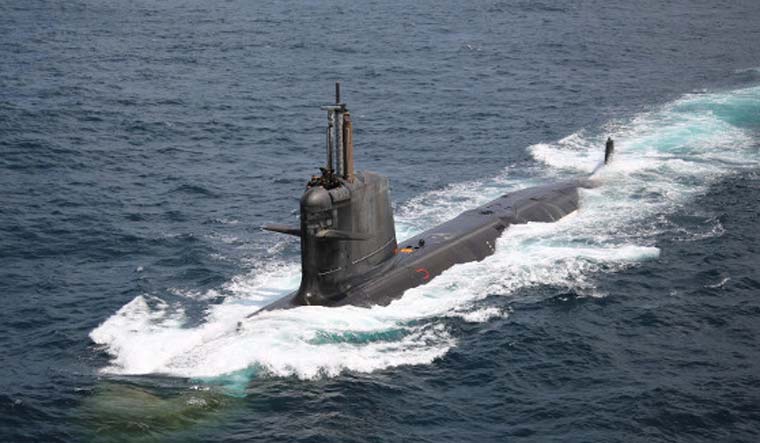After months of waiting, the second Scorpene-class submarine, named Khanderi, is all set to join the Navy fleet on September 28, at the Western Naval Command based in Mumbai.
Besides induction of Khanderi, the launch of indigenous P-17A frigate Nilgiri and commissioning of the country's largest dry dock in Mumbai will also be held on September 28. Defence Minister Rajnath Singh will preside over the events. The minister will then head to Goa where he will spend a 'day at sea' on aircraft carrier INS Vikramaditya, the country's largest warship.
“Three landmark events are planned on September 28. Commissioning of second Scorpene submarine Khanderi, launch of first P-17A frigate Nilgiri and commissioning of the largest dry dock of the Indian Navy,” Navy Vice Chief Vice Admiral Ashok Kumar said, adding, "With this, the Navy's reach and combat sustenance goes up tremendously."
In 2006, an agreement was signed to build six Scorpene-class submarines in India, between the French firm Naval Group (formerly known as DCNS) and Mazagon Dock Shipbuilders Limited, under Indian Navy’s $3.75 billion Project-75. The first submarine was scheduled to be delivered by 2012, but the project witnessed repeated delays. Originally, the entire project is expected to be completed by 2020.
However, the first Scorpene (Kalvari) was commissioned in December 2017 in the presence of Prime Minister Narendra Modi. Khanderi was launched into water in January 2017 and has since been undergoing a series of trials. The remaining submarines in the series are in advanced stages of manufacturing and trials.
On the delays in inducting the submarine, Vice Admiral Kumar said certain amount of delays and learnings happen along the way “which is acceptable,” and added that all issues with Khanderi have been resolved.
Repeated delays have led to cost escalation, as the cost of the Scorpene project now stands at Rs. 25,000 crore.
The Scorpene submarines can undertake multifarious missions like anti-surface warfare, anti-submarine warfare, intelligence gathering, mine laying, and area surveillance. The submarine is designed to operate in all theatres, with means provided to ensure interoperability with other components of a Naval Task Force. It is a potent platform, marking a generational shift in submarine operations.
also read
- VIDEOS | Mumbai boat accident: FIR filed against Navy speedboat driver as ferry disaster kills 13
- Indian Navy submarine collides with a fishing vessel off Goa coast, two fishermen missing
- Symbol of unshakable friendship with Russia, says Indian Navy as Russian submarine docks at Kochi
- Did Indian Navy quietly launch its fourth nuclear-powered ballistic missile submarine?
- In a major leap for India's defence system, Navy, DRDO successfully tests VL-SRSA missile system
The 66-metre long submarine is made up of a special kind of high-tensile steel which ensures that the warship can withstand high yield stress, allowing it to dive deeper. The submarine can operate at a depth of 300 metres underwater and travel 1,020km underwater. It can carry 18 torpedoes and tube-launched anti-ship missiles underwater or from the surface.
Speaking on the budget allocation, Vice Admiral Kumar admitted constraints of the force and added that they “will certainly seek more money.”
“What we need is more capital allocation of the budget... Share of Navy was 18 per cent of defence budget in 2012-13, which has come down to 13.6 per cent. We would like it to go back to 18-20 per cent,” he said.
The cost of aircraft carrier dry dock was Rs 1,320 crore, while the cost of the seven frigates is over Rs. 48,000 crore. The dry dock would be the biggest in the country and will have the capacity to berth INS Vikramaditya. For the P-17 frigates, over 2000 micro, small & medium enterprises are involved, and has nearly 80 per cent indigenous content.



